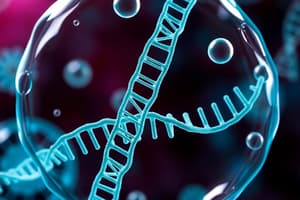Podcast
Questions and Answers
What are the products of pyruvate oxidation?
What are the products of pyruvate oxidation?
- 2 ATP, 2 NADH
- Acetyl CoA, CO2 (correct)
- 3 NADH, FADH2
- Acetyl CoA, NADH
Which process is characterized by the need for oxygen?
Which process is characterized by the need for oxygen?
- Aerobic Respiration (correct)
- Anaerobic Respiration
- Ethanol Fermentation
- Lactic Acid Fermentation
What is the primary function of DNA Polymerase 3 during DNA replication?
What is the primary function of DNA Polymerase 3 during DNA replication?
- Initiate synthesis
- Proofread DNA
- Synthesize new DNA (correct)
- Replace RNA primers
Which experiment demonstrated that DNA is the genetic material?
Which experiment demonstrated that DNA is the genetic material?
Which of the following is NOT a product of the Krebs Cycle?
Which of the following is NOT a product of the Krebs Cycle?
Flashcards
Anaerobic Respiration
Anaerobic Respiration
A type of cellular respiration that occurs in the absence of oxygen. It is less efficient than aerobic respiration but can sustain life for a short period. Common in bacteria, plants, and animals
Cellular Respiration
Cellular Respiration
The process by which a cell converts glucose into energy (ATP), carbon dioxide, and water. It occurs in the cytoplasm and mitochondria of cells.
DNA
DNA
A double-stranded molecule that carries the genetic information of an organism. It is composed of nucleotides: a phosphate group, a 5-carbon sugar (deoxyribose), and a nitrogenous base (adenine, guanine, cytosine, or thymine).
DNA Helicase
DNA Helicase
Signup and view all the flashcards
DNA Replication
DNA Replication
Signup and view all the flashcards
Study Notes
Cellular Processes
- Smooth Endoplasmic Reticulum (ER): Detoxifies, synthesizes lipids, and stores calcium ions.
- Phosphorylation: Modifies, activates, and deactivates proteins.
- Chaperone Proteins: Help in protein folding.
- Ribosomes: Formed in the nucleolus, sites of protein synthesis.
- Glycolysis Products: 2 ATP, 2 NADH, and 2 pyruvate.
- Pyruvate Oxidation Products: Acetyl CoA and CO2.
- Krebs Cycle Products: 1 ATP, 3 NADH, 1 FADH2, and CO2.
- Electron Transport Chain (ETC) Products: 29-30 ATP and H2O.
- NAD and FADH: Become reduced during the ETC.
- Endergonic Reactions: Require energy input (e.g., photosynthesis).
- Exergonic Reactions: Release energy (e.g., cellular respiration).
- Anaerobic Respiration: Doesn't require oxygen. Processes like Lactic Acid fermentation and Ethanol Fermentation occur during anaerobic respiration.
- Aerobic Respiration: Requires oxygen.
DNA Replication
- DNA Helicase: Breaks bonds between nitrogenous bases to unwind DNA.
- Topoisomerase: Relieves tension caused by unwinding.
- Primase: Initiates DNA synthesis on leading and lagging strands.
- DNA Polymerase III: Synthesizes new DNA using the template strand.
- DNA Polymerase I: Replaces RNA primers with DNA.
- Proofreading: Ensures accuracy during synthesis.
- Griffith Experiment: Showed a "transforming principle."
- Avery, MacLeod, and McCarty Experiment: Identified DNA as the transforming principle.
- Hershey-Chase Experiment: Demonstrated that DNA, not protein, is the genetic material.
- Chargaff's Rule: Equal amounts of adenine and thymine, and equal amounts of guanine and cytosine.
- Wilkins: Contributed to understanding DNA structure.
- Watson and Crick: Discovered the double helix structure of DNA.
- Meselson and Stahl: Demonstrated semiconservative DNA replication.
Studying That Suits You
Use AI to generate personalized quizzes and flashcards to suit your learning preferences.
Related Documents
Description
Test your knowledge on cellular processes including the smooth endoplasmic reticulum, phosphorylation, and the various stages of cellular respiration. Additionally, dive into the details of DNA replication and its associated enzymes. This quiz covers key concepts essential for understanding cellular biology.




